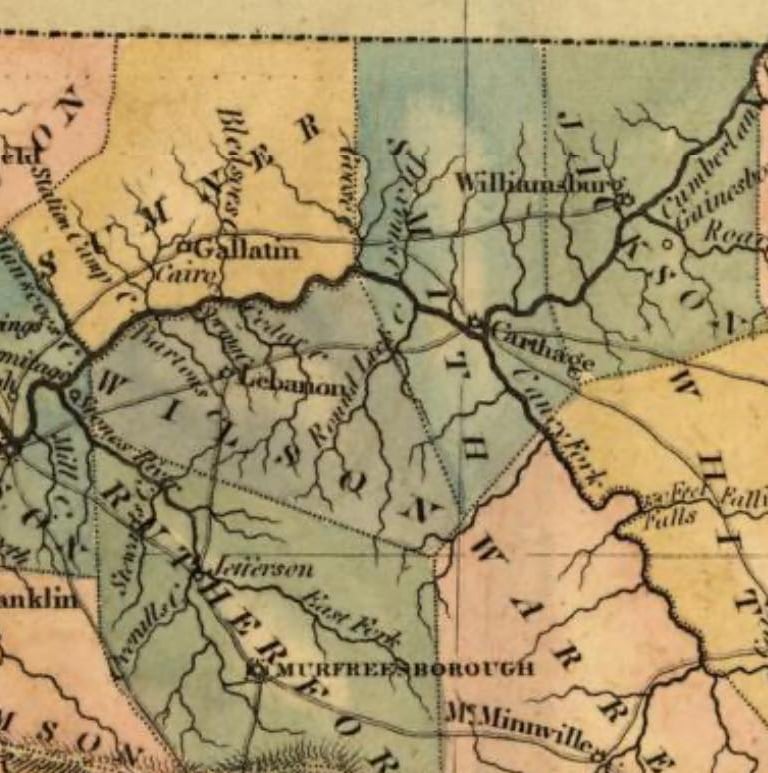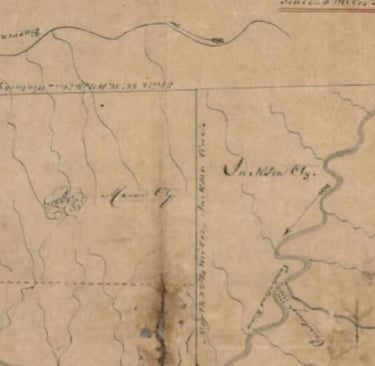Establishing Macon County: Chapter 45 (Sections 11-19)
This is a deep dive into Chapter 45 of the Private Acts of 1841-42 in the Tennessee General Assembly. This chapter officially formed Macon County from Smith and laid the groundwork for its boundaries, governance, and more!
COUNTY FORMATION & GOVERNANCE


Sections 11–19 set up Macon County’s basic government and legal structure. They require the commissioners to report their actions, take an oath and bond, keep financial records, and hand over remaining funds once buildings are finished. New commissioners must divide the county into seven civil districts, and the county is organized into a state militia regiment. Macon County is placed into the proper judicial and chancery districts, with appeals going to Nashville. Finally, the county court must adjust any boundary lines that violate constitutional distance requirements.
SECTION 11. That it shall be the duty of said commissioners to report all proceedings by them had under this act, to the first county court of said county of Macon to be holden therein, after the first day of March next, and it shall be the duty of said court to enter the same upon their records.
SECTION 12. That said commissioners, before they enter upon the duties of their office, shall take an oath before some Justice of the Peace, to honestly and faithfully perform the duties assigned by this act, to the best of their judgment, and they shall moreover enter into bond with approved security, in the penalty of five thousand dollars, payable to the chairman of the county court of Macon County and his successors in office, conditioned for the due and faithful performance of the duties enjoined upon them by this act, and for the just application or forthcoming of such funds as may come to their hands as commissioners as aforesaid.
Sections 11 and 12 establish strict oversight and accountability for the commissioners responsible for setting up Macon County. Section 11 requires these commissioners to present a full report of everything they have done under the act—such as the election for the county seat, land purchases, town layout, lot sales, and financial handling—to the very first session of the county court held after March 1. This ensures that the county court officially reviews and records their actions, creating a permanent legal record of how the county was organized.
Section 12 strengthens this accountability by requiring each commissioner, before beginning any duties, to take an oath before a Justice of the Peace promising to perform all responsibilities honestly and faithfully. In addition, they must provide a $5,000 bond with approved security, payable to the chairman of the county court. This bond serves as a financial guarantee that they will properly carry out their duties, handle public money responsibly, and make all funds available when required. Together, these sections ensure transparency, responsibility, and legal protection for the new county during its establishment.
SECTION 13. That said commissioners shall keep a regular and fair record and account of all monies by them received and expended, which statement shall, from time to time, when required by the county court of Macon county, be laid before said court, and when the public buildings of said county shall be completed, said commissioners shall, by order of said court, pay over any surplus money that may be in their hands to the county Trustee of said county for county purposes, and they shall, for their services, receive such reasonable compensation as shall be adjudged them by said county court.
SECTION 14. That Bennett Wright, Alexander Furguson, Edward Glover, and Jefferson Bratton, or a majority of them, shall have power and authority, and they are hereby appointed commissioners to lay off said county into seven civil districts, in which there shall be elected Justices of the Peace and constables, at the time prescribed by law for electing such officers in other counties in this State.
SECTION 15. That the county of Macon shall form one Regiment, and said Regiment in all its relation to the Militia of the State shall assume the place of the Regiment, and shall be attached to the ninth Brigade, and that the field officers, included in said county of Macon, shall meet at the house of Wm. Dunn in said county on the first Saturday in March next, and divide said Regiment into Battalions and Companies and provide for electing all officers in said Regiment into Battalions and Companies and provide for electing all officers in said Regiment in the manner pointed out by law.
SECTION 16. That the county of Macon be, and the same is hereby attached to the fourth Judicial Circuit and the Circuit courts therefor shall be held by the Judge of said circuit of the first Mondays in January, May and September, in each and every year, at the house of Wm. Dunn or such other place as the county court may direct.
Sections 14–16 detail how Macon County’s local government districts, militia structure, and court system were to be formally organized. Section 14 appoints four commissioners to divide the new county into seven civil districts. These districts serve as the basic units for local governance, ensuring that justices of the peace and constables can be elected at the same times and in the same manner as in other Tennessee counties. Section 15 integrates Macon County into the state militia system by designating it as a single regiment within the Ninth Brigade. The county’s field officers are instructed to meet at William Dunn’s house to divide this regiment into battalions and companies, establish its internal structure, and oversee the lawful election of militia officers. Section 16 attaches Macon County to the Fourth Judicial Circuit, providing it with a formal place in Tennessee’s court system. It outlines that circuit court sessions will be held three times each year at William Dunn’s house—or any other site the county court chooses—until official public buildings are completed.
SECTION 17. That the county of Macon shall be attached to the chancery court district to be holden at Carthage, Smith County.
SECTION 18. That all appeals, writs of error and appeals in the nature of writs or error from the circuit courts of said county of Macon, shall be taken to the Supreme Courts to be held for the Middle division at Nashville.
Section 19 addresses Macon County’s boundaries, ensuring they comply with constitutional requirements. If any part of the county comes too close to the county seats of the surrounding counties from which its land was taken, the county court was required to appoint a surveyor to re-measure and mark the lines properly. The surveyor’s report would then be recorded by the county clerk, and the corrected lines would become the official boundaries of the county. Over the years, Macon County’s boundaries have been adjusted multiple times to address such issues or reflect changes in neighboring counties. These adjustments occurred in 1843–44, 1853–54, 1865–67, 1889, 1901, 1903, 1905, 1919, and 1927, involving land transfers with Smith, Sumner, Trousdale, and Clay Counties. These repeated changes highlight the ongoing need to maintain accurate and constitutionally compliant county lines.
Written by: Caleb Fleming, Macon County History Preservation Project
Sections 17 and 18 place Macon County within the appropriate higher courts of Tennessee’s judicial system. Section 17 assigns the county to the chancery court district held at Carthage in Smith County, meaning all chancery matters—such as equity cases, land disputes, and certain civil issues—will be heard there. Section 18 establishes that any appeals or writs of error from Macon County’s circuit court must be taken to the Tennessee Supreme Court for the Middle Division, which meets in Nashville, ensuring a clear appellate path for the county’s legal cases.


Section 13 requires the commissioners to keep clear, accurate records of all money they receive and spend while establishing the county. They must present these financial reports to the county court whenever asked. Once the county’s public buildings are completed, any leftover funds in their possession must be turned over to the county trustee for general county use. The commissioners are also entitled to receive reasonable compensation for their work, as determined by the county court.
